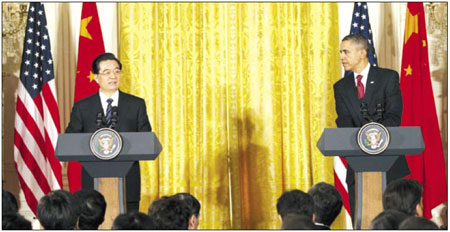US
Leaders signal direction in ties
Updated: 2011-01-20 13:44
By Tan Yingzi and Wu Jiao (China Daily)
|
|
WASHINGTON - With China-United States relations at a crossroad, the two leaders have pointed out the direction for future bilateral relationships - a cooperative partnership based on mutual respect and mutual benefit.
On the second day of President Hu Jintao's state visit to the US, US President Barack Obama greeted Hu with the warmest welcome ceremony at the South Lawn of the White House on a golden winter morning, joined by dozens of cheerful young American students and excited Chinese Americans.
In "a candid, pragmatic and constructive atmosphere", Hu said, the two leaders discussed how to push forward the positive, cooperative and comprehensive relationships they mapped out during Obama's state visit to China in 2009.
Bilateral ties saw periods of tension last year when the both sides disagreed on a series of issues, including the US arms sales to Taiwan, Obama's meeting with the Dalai Lama, Chinese currency reform, Chinese trade policies and the regional security.
Hu and Obama met the press after the talks and addressed the importance of the bilateral relationship, recognizing the common ground and disagreements and detail plans to strengthen ties.
They touched on major topics, such as currency, trade policy, military ties, Taiwan questions, human rights as well as global challenges in nuclear nonproliferation, climate change and the world economic recovery.
"China-US cooperation has great significance for our two countries and the world," Hu said.
"The two sides should firmly adhere to the right direction of our relationship; respect each other's sovereignty, territorial integrity and development interests; promote the long-term sound and steady growth of China-US relations; and make even greater contributions to maintaining and promoting world peace and development."
The two sides decided to continue working toward a partnership that "advances common interest, address shared concerns and highlights international responsibilities", a joint statement said.
And bilateral strategic trust must be nurtured and deepened through dialogue and cooperation and the two sides affirmed the need to address areas of disagreement, expand common ground and strengthen coordination on a range of issues, it said.
To address the rise of China and the US strengthened role in the Asia, the statement said "the United States reiterated that it welcomes a strong, prosperous and successful China that plays a greater role in world affairs. China welcomes the United States as an Asia-Pacific nation that contributes to peace, stability and prosperity."
Military to military exchanges, the weakest point in the bilateral relations, will be enhanced with the visit of General Chen Bingde, chief of the PLA General Staff, to the US in the first half of this year.
Both presidents expressed deep concerns over tensions on the Korean Peninsula and said they will continue the efforts to cooperate closely. They also called for a "sincere and constructive" inter-Korean dialogue.
Obama said he is looking for a relationship in a spirit of cooperation and "healthy competition".
Cooperation with China is good for the US, China and the rest of the world, he said, and competition will inspire both countries and make them more innovative and competitive.
"Together we've shown that the United States and China, when we cooperate, can receive substantial benefits," he said.
US experts saw this summit and the statement as positive signs for future relations, but more concrete work needs to be done.
Jamie Metzl, executive vice-president of the Asia Society, said it is very important and positive to see the two presidents address differences on issues including human rights and currency reform.
"Clearly there is a lot room for growth in US-China relations. From this point, it seems the visit is going very well," he told China Daily.
"Both sides are discussing areas for collaboration. And the issues that divide us are being explored in a positive and constructive way.
"But the ultimate test of whether the visit is a success will be based on what happens when President Hu returns to Beijing."
Yukon Huang, senior associate in the Carnegie Asia Program, Carnegie Endowment for International Peace, said the two countries are trying to find common grounds for more productive dialogues as the currency issue becomes less important.
"The two countries have fundamentally different political environments and that makes it difficult," he said.
"The economical woes of the US only exacerbate the tension. But China's economy is growing at an average 10 percent per year. It has more flexibility to find a win-win solution."
Philip Levy, resident scholar at the American Enterprise Institute, sees a shift in the Obama administration policy on China, which likely reflects the support of the new Republican leadership in the House.
"The House Ways and Means leadership have made clear that they are less interested in denunciations of currency practices than in practical attempts to solve trade problems," he told China Daily.
"It is not that the United States is any less interested in seeing a currency appreciation; President Obama made that clear. Rather, it seems to be a constructive attempt to find those issues where cooperative action is possible."
To consolidate the foundation laid by the two leaders, this year will see more high-level exchanges between the two countries.
Both presidents will meet again this year, including at the 2011 Asia-Pacific Economic Cooperation leaders' meeting in Hawaii.
US Vice-President Joseph Biden will visit China later this year, followed by the visit of Vice-President Xi Jinping.
Zhang Yuwei and Ariel Tung in New York contribute to this story.
China Daily
Specials

President Hu visits the US
President Hu Jintao is on a state visit to the US from Jan 18 to 21.

Ancient life
The discovery of the fossile of a female pterosaur nicknamed as Mrs T and her un-laid egg are shedding new light on ancient mysteries.

Economic Figures
China's GDP growth jumped 10.3 percent year-on-year in 2010, boosted by a faster-than-expected 9.8 percent expansion in the fourth quarter.
